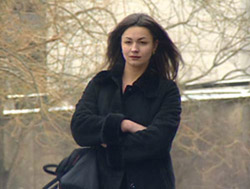Released Slovak aid worker finally appears on television By Tomas Vrsovsky
PRAGUE, Czech Republic - The Slovak aid worker Miriam Jevikova, who was kidnapped in the Northern Caucasus last May and freed in November, recently appeared on television for the first time. Her statement, however, gave no substantially new information about the circumstances of her abduction and release.
In a 14 minute documentary shown on Czech Television's investigative program "Reporteri CT" on February 21, she described her abduction and release, but denied knowing her abductors' motives or identities. This is exactly what some experts in the Chechen conflict predicted after her release, pointing to the mystery shrouding earlier abduction cases in the region.
"Several armed men pulled me out of a car, made me kneel down, held a sub-machine gun to my head, cuffed my hands behind my back, put a black mask over my head, and forced me into their car. We drove for quite awhile before arriving at some house where they made me sit on an iron bed, tied me to it, and then began questioning me about who I was, where I came from, etc."
During her internment, Jevikova managed to establish contact with the masked kidnappers, but they in fact used it to torture her psychologically. "Very often I'd ask for information about my mother. But they told me that she died of a broken heart because no one wanted to pay ransom for me and no one cared about me."
"I was extremely frightened; you feel so powerless and unable to do anything. There I was, all alone and not knowing who these people were nor even what they wanted."
According to Russian sources, Jevikova was found in an empty house in Grozny by Russian security forces in late November. Slovak and Czech authorities also claimed that she was freed in a special operation conducted by Russian forces and that no ransom had been paid.
Yet the Russian newspaper Novaya gazeta wrote in their January 27 issue that a ransom had, indeed, been paid; and, more important, that her abductors were members of the Russian special service.
"Involved in her abduction were four locals from Ingushetia, who earlier worked as bodyguards for a wealthy Russian businessman. They then handed her over at the Chechen border to two men from Russian special services - Anatoly (a Russian) and Yunus (a Chechen). And they held her captive in Yunus' house," said Novaya gazeta reporter Vyacheslav Izmailov in the documentary.
Izmailov is a former special service officer who now acts as a negotiator in abduction cases and has helped to release dozens of kidnapped men and women. However, Slovak and Czech authorities said his information was absolute nonsense.
Nevertheless, there is no doubt about the circumstances of Jevikova's release. "At first there was only silence. Then there was a banging at the door and shouts of "Open up, it's the police!" They broke the door down and once inside, began searching every room in the house. Then they untied me and quickly rushed me into their vehicle," said Jevikova.
Andrei Babitsky, the Russian journalist who was kidnapped in the Caucasus in 2000 on orders of the Russian authorities, warns against the risks of traveling into that region. "No laws are enforced there. On the contrary, it's a land where a very specific social culture exists. Without any knowledge of all the circumstances, risks, local rules and various people, plus without bodyguards surrounding you, one should never even approach the place," he said.
Jevikova, a student at Charles University in Prague, worked for the Prague-based Organization for Aid to Refugees (OPU) where she was mainly concerned with the problems of Chechen refugees, and also wrote articles for one of the Czech newspapers.
She also had made several trips to Northern Caucasus. In late May 2004, she spent a few days in the southern Russian town of Pyatigorsk where, from her hotel, she phoned friends in Nazran asking them to meet her at the Ossetian-Ingush border. However, she did not show up there at the appointed time. Soon after, OPU received a ransom request for one million dollars, a sum this small NGO was unable to pay.
She was finally freed on November 23. Three days later she arrived in the Slovak capital of Bratislava, meeting her mother there. The kidnappers have not been brought to justice as yet.
(T/E) RELATED ARTICLES:
· Kidnapped Slovak freed in Northern Caucasus (PW, Nov 23, 2004)
· Young Slovak reported missing in Northern Caucasus (PW, June 9, 2004)
DISCUSSION FORUM
|

